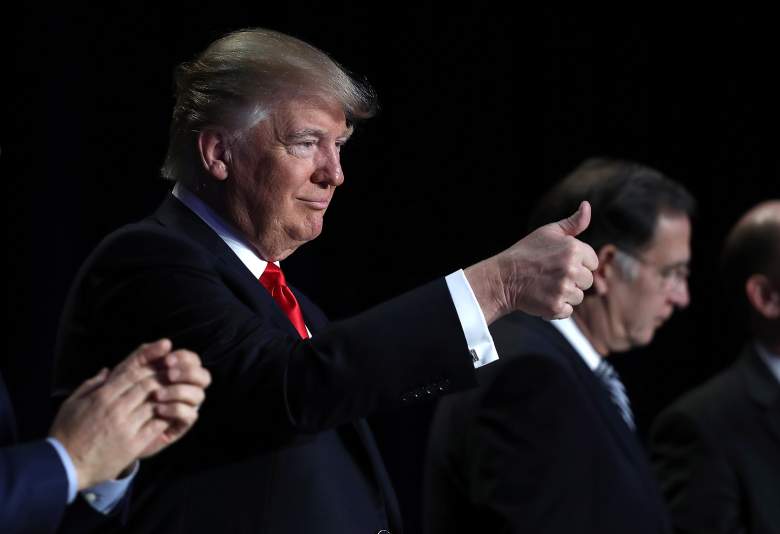
Donald Trump is introduced at the National Prayer Breakfast on February 2nd, 2017 in Washington, DC. (Getty)
A new poll from Quinnipiac suggests that Americans do not believe President Donald Trump’s immigration policy will make the country safer, with many believing Trump will make the United States less safe.
In the survey, which was conducted by speaking to 1,155 voters nationwide from February 2nd through February 6th, 41 percent of voters said that Donald Trump’s policies will make America less safe from terrorism, compared to 40 percent who said that they’ll make the country safer. An additional 16 percent said that his policies won’t make the country any more or less safe.
This comes as President Donald Trump’s recent executive order suspending immigration from seven Muslim-majority countries is facing legal challenges, and according to the poll, about half of Americans oppose the travel ban. Fifty-one percent of voters told Quinnipiac they oppose Donald Trump’s decision to suspend travel from these seven countries for 90 days, compared to 46 percent who support it.
Even more voters are opposed to Donald Trump’s decision to suspend the immigration of refugees for 90 days, with 60 percent of those polled saying they oppose that policy while 37 percent support it. And 70 percent of those polled oppose indefinitely suspending the admittance of Syrian refugees.
While the Trump administration has said that its travel ban was not meant to be a ban on Muslims, voters don’t see it that way, with 51 percent telling Quinnipiac the executive order was intended to ban Muslims from entering the U.S.
This is not to say that Americans do not believe the country is threatened by terrorism, though. Seventy percent of those polled said that it is “very likely” or “somewhat likely” that there will be a terrorist attack on American soil with a large loss of life.
Donald Trump’s disapproval rating is 51 percent in this poll, which is up from 44 percent two weeks ago. His unfavorable rating is also 52 percent. In addition, 54 percent of voters said Trump is not honest, 50 percent said he does not have good leadership skills, 52 percent said he doesn’t care about average Americans, 60 percent said he is not level-headed, and 58 percent said he does not share their values. However, 70 percent of voters said Trump is a strong person, and 65 percent said he is intelligent.
Fifty-six percent of Americans disapprove of the way Trump is handling foreign policy, and the same percentage disapproves of the way he’s handling immigration. But on the other hand, a plurality of voters, 44 percent, approve of the way the president is handling the economy.
Finally, Steve Bannon, Donald Trump’s chief strategist, is far more well-known among Democrats than Republicans, as 69 percent of Democrats said they have an unfavorable view of Bannon, and 65 percent of Republicans said they haven’t heard enough about him.
President Donald Trump’s approval rating has been unusually low in virtually every major poll conducted over the past few weeks. According to Gallup, Trump’s approval rating is currently at an average of 43 percent. For comparison, Barack Obama had a 64 percent approval rating in February 2009, and George W. Bush had a 59 percent approval rating in February 2001.
On Twitter this week, President Trump said that all negative polls are fake news. The president typically points to the fact that he proved all the polls wrong when he won the election. But on a national level, the polls in the 2016 election were actually relatively accurate. On November 8th, Real Clear Politics’ national polling average had Hillary Clinton at 46.8 percent and Donald Trump at 43.6 percent, and Clinton ended up winning nationally, 48.2 percent to 46.1 percent. It was on a state-by-state level, however, that the polls were less accurate, and so it was not predicted that Trump would win the Electoral College by picking up states such as Pennsylvania and Wisconsin.